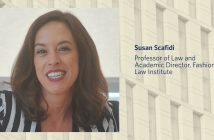New York State Senator Alessandra Biaggi ’12 was interviewed in an Elle article, where she discussed her proposed legislation that would increase regulation in the fashion industry.
“Fashion has basically operated in this black box for so long,” says New York State Senator Alessandra Biaggi. She’s talking about the way that, unlike the finance, food, and automotive industries, fashion has been able to operate mostly without governmental oversight in the United States. There’s no equivalent of the FDA for fashion. And, she admits, “it’s not the industry that is on the top of many regulators’ minds.” While there are individual designers and fashion houses who seem firmly committed to change, she believes self-regulation isn’t enough. And if her new proposed legislation passes, it won’t have to be.
A younger, often more progressive cohort is entering politics, bringing with it a keen sense of urgency on the climate crisis. Biaggi is in that category; when it comes to this particularly pertinent issue, she believes that “what is at stake here is our entire world.” She first became passionate about the intersection of fashion, climate, and social justice after taking classes at Fordham University’s Fashion Law Institute, which opened her eyes to the connections between those subjects. She rattles off statistics, including the fact that fashion is responsible for between 4 and 8.6 percent of global greenhouse gas emissions. A number of brands have recently touted carbon neutrality or outlined steps to green operations, but, Biaggi says, “self-regulating does not lead to good outcomes. I don’t care if you are the most well-intentioned person or entity, it’s not ethical to self-police.”
…
If passed, the Fashion Act would become the first legislation of its kind in the United States. But “the bill is not intended to be an ‘I got you’ to the fashion industry at all,” Biaggi is quick to insist. “We wanted to do it in a way that didn’t scare companies, but made them want to be part of this and also kept them following the standards.” She emphasizes the fact that New York is our nation’s fashion capital, and that among those who’d stand to benefit are her Bronx- and Westchester-based constituents. Some of them work in these industries, then at the end of the day, they “travel home to their environmentally justice-impacted communities,” so it was crucial for her to make sure that the Fashion Act addressed both the labor and environmental aspects of the industry.



